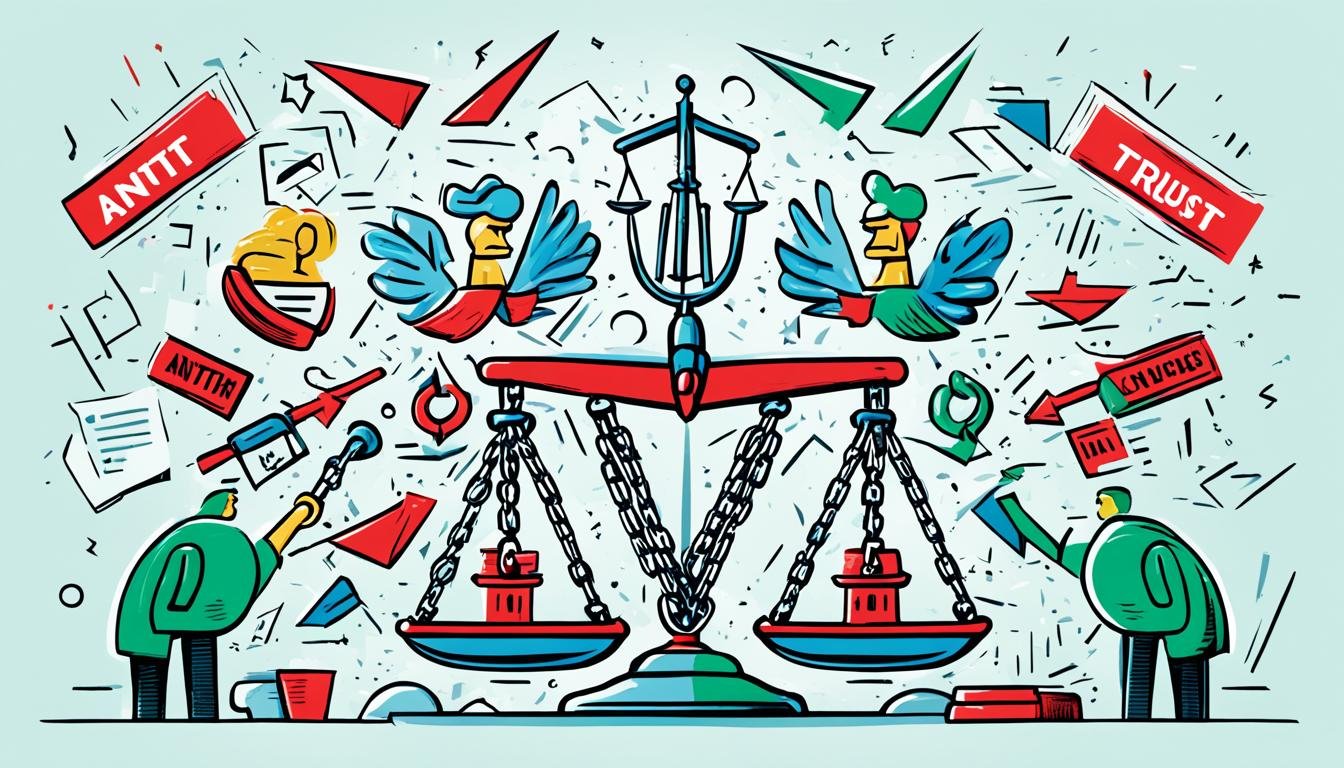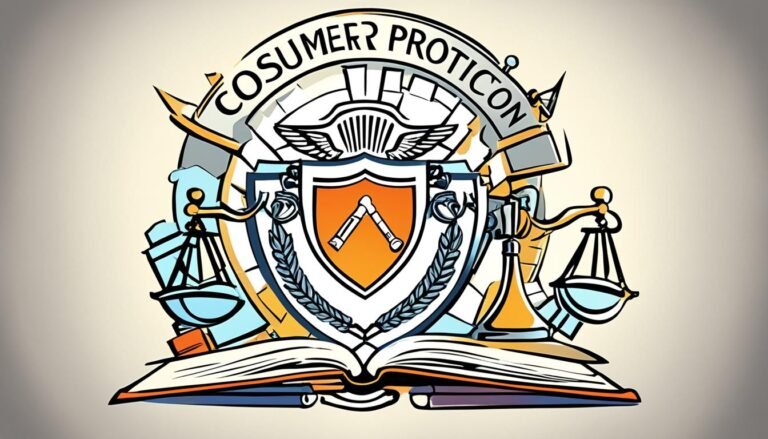Navigating Anti-Trust Laws and Compliance Rules
Did you know that antitrust violations can result in fines of up to $100 million for corporations and up to 10 years in prison for individuals? Compliance with antitrust laws is crucial for businesses to avoid severe penalties and reputational damage.
Key Takeaways:
- Antitrust laws are regulations designed to promote fair competition in the marketplace and protect consumers from anticompetitive practices.
- The key federal antitrust laws include the Sherman Act, the Federal Trade Commission Act, and the Clayton Act.
- The Federal Trade Commission (FTC) and the Department of Justice are responsible for enforcing these laws.
- Antitrust violations can lead to significant fines and imprisonment.
- Compliance with antitrust laws is essential to avoid penalties and safeguard business reputation.
The Sherman Act
The Sherman Act, passed in 1890, is a landmark legislation in the United States that aims to promote fair competition by prohibiting contracts, combinations, and conspiracies that restrain trade or monopolize industries. This act plays a crucial role in maintaining a level playing field for businesses and protecting consumer interests.
Under the Sherman Act, antitrust violations are strictly regulated and carry significant penalties. Violators can face criminal sanctions imposed by the Department of Justice, including fines and imprisonment. Certain acts, such as price-fixing and market division, are considered per se violations, which means they are almost always illegal and do not require proof of actual harm to competition or consumers.
The Sherman Act also imposes severe penalties for antitrust violations. Corporations found guilty of Sherman Act violations can face fines of up to $100 million, while individuals can be sentenced to up to 10 years in prison. These penalties serve as deterrents to anticompetitive behavior and ensure that businesses adhere to fair competition practices.
“The Sherman Act is a cornerstone of antitrust legislation, designed to protect markets from monopolistic practices and encourage free and fair competition.”
By prohibiting restraint of trade and monopolization, the Sherman Act helps prevent the concentration of market power in the hands of a few dominant players. It fosters an environment that promotes competition, innovation, and a wide range of choices for consumers.
With its historical significance and ongoing relevance, the Sherman Act remains a critical tool to protect market dynamics and ensure fair competition in various industries. It continues to play a pivotal role in regulating businesses and safeguarding consumer welfare in the United States.
Key Points:
- The Sherman Act prohibits contracts, combinations, and conspiracies that restrain trade or monopolize industries.
- Antitrust violations under the Sherman Act carry severe penalties, including fines and imprisonment.
- Acts such as price-fixing and market division are considered per se violations and are almost always illegal.
- Fines under the Sherman Act can reach up to $100 million for corporations and prison sentences of up to 10 years for individuals.
The Federal Trade Commission Act
The Federal Trade Commission Act, passed in 1914, is a crucial piece of legislation that addresses unfair methods of competition and deceptive acts or practices in the marketplace. Under the FTC Act, the Federal Trade Commission (FTC) has the authority to investigate and take action against anticompetitive practices that harm consumers and hinder fair competition.
While the FTC Act does not directly enforce the Sherman Act, it can bring cases against activities that violate the Sherman Act. This means that the FTC can use the FTC Act to address antitrust violations and protect consumers from unfair business practices that restrict competition.
The primary focus of the FTC is on segments of the economy where consumer spending is high. By targeting these areas, the FTC aims to ensure that consumers have access to competitive markets and a wide range of choices.
Key Provisions of the Federal Trade Commission Act
The Federal Trade Commission Act contains several key provisions that are crucial in upholding fair competition and protecting consumers:
- The prohibition of unfair methods of competition: The FTC Act prohibits businesses from engaging in practices that unfairly limit competition, such as predatory pricing, boycotts, or exclusive dealing arrangements.
- The prohibition of deceptive acts or practices: The FTC Act also makes it illegal for businesses to deceive consumers through false advertising, fraudulent marketing tactics, or misleading product claims.
By enforcing these provisions, the FTC ensures that businesses operate in a manner that promotes fair competition and protects consumers from deceptive practices.
The Role of the Federal Trade Commission
The FTC plays a vital role in enforcing the Federal Trade Commission Act and other antitrust laws. The commission actively investigates potential violations and takes appropriate action to address anticompetitive practices. This includes conducting thorough investigations, filing administrative complaints, and seeking injunctive relief.
Furthermore, the FTC works closely with the Department of Justice (DOJ) in enforcing antitrust laws. While the DOJ focuses on specific industries, such as telecommunications and transportation, the FTC covers a broader range of sectors, ensuring comprehensive enforcement of antitrust laws across the economy.
The FTC also collaborates with state attorneys general and private plaintiffs to enforce antitrust laws at the state level. This multi-faceted approach strengthens the overall enforcement efforts and helps protect consumers from unfair business practices.
The Importance of the Federal Trade Commission Act
The Federal Trade Commission Act is instrumental in upholding fair competition, preventing monopolistic behavior, and safeguarding consumer interests. By prohibiting unfair methods of competition and deceptive acts or practices, the FTC Act helps create a level playing field for businesses and fosters an environment where innovation and choice thrive.
Through its enforcement efforts, the FTC ensures that businesses adhere to ethical practices and do not engage in anticompetitive behavior that may harm consumers or hinder competition. By encouraging fair competition, the FTC Act ultimately benefits consumers through lower prices, higher quality products, and a wider range of options.
Overall, the Federal Trade Commission Act serves as a crucial safeguard against unfair business practices and promotes healthy market competition. Its impact extends far beyond individual cases, contributing to the overall well-being of the economy and safeguarding consumer trust.
The Clayton Act
The Clayton Act, passed in 1914, is an important federal antitrust law that addresses specific practices not clearly prohibited by the Sherman Act. This act aims to promote fair competition and protect consumers from anticompetitive behavior. Let’s delve into some of the key provisions of the Clayton Act:
Prohibition of Mergers and Acquisitions
The Clayton Act prohibits mergers and acquisitions that may substantially lessen competition or tend to create a monopoly. This provision is crucial in ensuring that market participants do not engage in consolidating their power at the expense of competition.
Restrictions on Discriminatory Pricing and Services
In addition to addressing mergers, the Clayton Act also prohibits certain discriminatory pricing and services in transactions between merchants. This provision helps prevent unfair advantages being conferred upon certain market participants, ensuring a level playing field.
Private Parties’ Right to Sue for Damages
The Clayton Act empowers private parties to file lawsuits and seek triple damages if they have been harmed by conduct that violates either the Sherman or Clayton Act. This provision reinforces the importance of private enforcement in antitrust matters and encourages affected parties to assert their rights.
Overall, the Clayton Act plays a critical role in safeguarding competition and protecting consumers from anticompetitive practices. Its provisions address specific practices that may not be explicitly covered by the Sherman Act, further enhancing the effectiveness of antitrust regulation.
| Provisions | Description |
|---|---|
| Prohibition of Mergers and Acquisitions | The Clayton Act prohibits mergers and acquisitions that may substantially lessen competition or tend to create a monopoly. |
| Restrictions on Discriminatory Pricing and Services | The act prohibits certain discriminatory pricing and services in transactions between merchants to ensure fair competition. |
| Private Parties’ Right to Sue for Damages | The Clayton Act allows private parties to sue for triple damages when they have been harmed by conduct violating antitrust laws. |
Overview of Antitrust Laws
Antitrust laws are a vital component of the regulatory framework that governs market competition and prevents the concentration of market power. These laws are designed to safeguard fair competition, protect consumers, and ensure a level playing field for businesses across various industries.
Competition lies at the heart of antitrust laws, as they aim to foster a marketplace where businesses compete on their merits, providing consumers with greater choices, lower prices, and improved quality. By prohibiting anticompetitive practices such as price fixing and colluding, antitrust laws promote healthy market dynamics.
One of the primary objectives of antitrust laws is to prevent the emergence of monopolies, which can have detrimental effects on competition. Monopolies can limit consumer options, stifle innovation, and exert undue market influence, leading to higher prices and decreased consumer welfare.
Violating antitrust laws can result in legal consequences, including civil and criminal penalties. Civil penalties often involve fines that can range from thousands to millions of dollars, while criminal penalties may include imprisonment for individuals involved in serious antitrust violations.
https://www.youtube.com/watch?v=5dP1SSAvwAs
It is important to understand that antitrust laws are not only applicable to large corporations or specific sectors but rather to businesses across all industries. These laws offer protection to businesses of all sizes, safeguarding fair competition and preventing the abuse of market power.
By upholding the principles of fair competition, antitrust laws play a crucial role in promoting consumer welfare, encouraging innovation, and fostering economic growth.
Enforcement of Antitrust Laws
Enforcement of antitrust laws is the responsibility of two main federal agencies: the Federal Trade Commission (FTC) and the Department of Justice (DOJ). While both agencies play critical roles in ensuring compliance with federal antitrust laws, their jurisdictions and focus areas differ.
Federal Trade Commission (FTC)
The FTC is primarily tasked with enforcing antitrust laws in industries with significant consumer spending. As an independent regulatory body, the FTC investigates potential antitrust violations and takes appropriate legal action to address them.
The FTC has the authority to conduct investigations and file administrative complaints against companies and individuals engaged in anticompetitive practices. In addition, the FTC can seek injunctive relief, such as restraining orders or divestitures, to prevent further harm to competition.
Department of Justice (DOJ)
The DOJ is responsible for enforcing antitrust laws in specific sectors, including telecommunications, banks, railroads, and airlines. Working closely with the FTC, the DOJ investigates potential violations and pursues legal action against companies and individuals engaged in antitrust violations.
The DOJ has the authority to initiate civil and criminal prosecutions. In cases where criminal antitrust violations are identified, the DOJ can seek substantial fines and imprisonment for individuals found guilty of antitrust crimes.
Both the FTC and the DOJ have the power to bring antitrust litigation in federal courts, demanding remedies for antitrust violations and seeking to restore market competition.
Investigations and Legal Action
Both agencies have the authority to initiate investigations based on their own findings or in response to complaints from consumers, competitors, or other stakeholders. These investigations can be conducted proactively or as a result of mergers, acquisitions, or business practices that warrant antitrust scrutiny.
Once an investigation is initiated, the agencies gather evidence, review documents, interview witnesses, and assess the competitive effects of the alleged antitrust violations. If they find sufficient evidence of antitrust violations, the agencies can pursue legal action.
Legal actions may include filing lawsuits, seeking injunctions, imposing fines, and advocating for divestitures or other remedies to restore competition in the affected markets.
Ensuring the enforcement of antitrust laws is essential to maintaining fair competition and protecting consumers from anticompetitive practices. The collective efforts of the Federal Trade Commission and the Department of Justice are critical in upholding the integrity of the market and preventing the concentration of market power.
State Antitrust Laws
In addition to federal antitrust laws, individual states have also enacted their own antitrust laws to further protect against anticompetitive practices. These state laws are enforced by state attorneys general and can also be utilized by private plaintiffs in legal proceedings. State antitrust laws are often modeled after the federal antitrust laws, providing an additional layer of regulatory oversight. Through these laws, state authorities and private parties have the power to take legal action against anticompetitive conduct and pursue damages for any harm caused.
State antitrust laws serve as a vital tool in ensuring fair market competition and safeguarding consumer interests at the local level. By addressing anticompetitive practices specific to their jurisdictions, state attorneys general and private plaintiffs play a critical role in protecting market dynamics and promoting a level playing field.
Benefits of Antitrust Laws
Antitrust laws are designed to promote healthy competition, providing numerous benefits for consumers. By fostering an environment of fair market competition, these laws have a positive impact on various aspects of the economy, resulting in lower prices, higher quality products and services, more choices, and increased innovation.
Competition plays a crucial role in driving down prices. When businesses have to compete for customers, they are motivated to offer their products and services at the most competitive prices possible. This leads to cost savings for consumers as they have access to a wider range of options that are priced competitively.
In addition to lower prices, antitrust laws also contribute to higher quality products and services. When companies have to vie for customers in a competitive marketplace, there is a strong incentive to enhance the quality of their offerings. This leads to continuous improvement, resulting in products and services that meet and exceed customer expectations.
Antitrust laws also create a marketplace with more choices for consumers. Through competition, businesses are compelled to differentiate themselves by offering unique features, designs, and experiences. This diversity provides consumers with a wealth of options, allowing them to select the products and services that best meet their individual preferences and needs.
Furthermore, fostering competition through antitrust laws drives innovation. In a competitive environment, businesses are constantly seeking new ways to gain an edge over their rivals. This leads to continuous research and development efforts, technological advancements, and the introduction of groundbreaking products and services that push the boundaries of what is possible.
“Antitrust laws have been instrumental in promoting competition, which has resulted in a wide range of benefits for consumers, including lower prices, higher quality products and services, more choices, and greater innovation.”
By preventing monopolies and anticompetitive practices, antitrust laws ensure a level playing field where businesses must compete fairly. This helps prevent the consolidation of market power in the hands of a few dominant players, who could otherwise exploit their position to the detriment of consumers.
In conclusion, antitrust laws play a vital role in creating a competitive marketplace that benefits consumers in multiple ways. Through competition, consumers enjoy lower prices, higher quality products and services, more choices, and the continuous development of innovative solutions. By regulating and preventing anticompetitive practices, antitrust laws help safeguard consumer interests and ensure a fair and thriving economy.
Major Example of Antitrust Law
In January 2023, the Department of Justice and several states filed an antitrust lawsuit against Google, alleging illegal monopolization of the digital advertising business. The lawsuit claims that Google has engaged in anticompetitive conduct to eliminate or diminish competition, curtail innovation, and raise advertising fees.
“Google’s monopolistic practices in the digital advertising market have harmed competitors, stifled innovation, and ultimately led to higher advertising costs for businesses.”
This case highlights the importance of antitrust laws in preventing the abuse of market power by dominant players in the industry. By closely scrutinizing and addressing anticompetitive practices, such lawsuits aim to promote fair competition, protect consumers, and ensure a level playing field for businesses operating in the digital advertising sector.
| Key Allegations: | Impact: |
|---|---|
| Illegal monopolization of digital advertising | Higher advertising fees |
| Elimination or diminishment of competition | Reduced innovation |
Criticisms of Antitrust Laws
While antitrust laws are implemented with the intention of promoting fair competition and protecting consumers, they have also faced criticisms from certain sectors. Critics argue that these regulations interfere with the free market and reduce efficiency. They contend that businesses should be allowed to compete as they see fit, with minimal government intervention. According to this perspective, a free market without antitrust laws would enable businesses to offer the best prices and foster innovation, ultimately benefiting consumers.
However, proponents of antitrust laws argue that they are crucial in preventing monopolies and maintaining competition. They believe that without regulatory measures in place, businesses could engage in anticompetitive practices that harm consumers. Antitrust laws are designed to ensure that market power is dispersed and that there is a level playing field for all businesses, promoting competition and protecting consumers from potential negative consequences, such as higher prices and reduced innovation.
“Antitrust laws are an essential tool in preserving the competitive landscape and preventing market abuses. They strike a balance between business autonomy and the protection of consumer interests, ensuring fair and efficient market conditions.”
Curtailing Monopolies
One of the primary aims of antitrust laws is to prevent the formation of monopolies, which can have detrimental effects on competition and consumer welfare. Critics argue that excessive regulation hinders the natural evolution of the market and may stifle the growth of innovative and successful companies. However, proponents emphasize that a lack of antitrust laws could lead to the concentration of market power in the hands of a few dominant firms, reducing competition and potentially harming consumers through higher prices and limited choices.
Efficiency vs. Reduced Competition
The balance between efficiency and reduced competition is another area of contention. Critics argue that antitrust regulations impede efficiency by imposing restrictions on businesses and limiting their ability to operate freely. They contend that a laissez-faire approach, without government intervention, would allow companies to maximize their productivity and offer the most efficient products and services. Proponents, on the other hand, emphasize that the goal of antitrust laws is not to hinder efficiency, but rather to maintain a competitive market that benefits consumers in the long run. They argue that reduced competition due to monopolistic practices can lead to a lack of innovation and higher prices for consumers.
In conclusion, the criticisms surrounding antitrust laws mainly revolve around concerns about the free market, government intervention, efficiency, and reduced competition. While critics argue that minimal regulation would lead to optimal outcomes for consumers, proponents believe that antitrust laws are necessary to prevent the abuse of market power and ensure fair competition. Finding the right balance between regulatory oversight and market freedom remains a complex challenge in maintaining a competitive marketplace that benefits both businesses and consumers.
Conclusion
Antitrust laws are a critical component of safeguarding fair competition, safeguarding consumer interests, and preventing the consolidation of market power. These laws establish penalties for antitrust violations and are enforced by prominent agencies such as the Federal Trade Commission (FTC) and the Department of Justice (DOJ). Despite some debates and criticisms, antitrust laws remain indispensable in fostering an open marketplace that benefits consumers through lower prices, higher quality products, and increased innovation.
By maintaining competition, antitrust laws ensure that no single entity dominates a particular industry, allowing consumers to enjoy the advantages of choice and affordability. The enforcement of these laws by the FTC and DOJ ensures that anticompetitive practices are addressed and punished accordingly. Through administrative complaints, injunctive relief, and criminal prosecution, these agencies actively combat violations of antitrust laws to maintain a level playing field.
While some critics argue that antitrust laws interfere with the free market and reduce efficiency, proponents assert that these regulations are essential for preventing monopolies, preserving competition, and safeguarding consumer welfare. Antitrust laws promote market dynamics that encourage businesses to innovate and offer competitive prices, driving overall economic growth and benefiting consumers in the long run. By balancing the delicate equilibrium between competition and consolidation, antitrust laws play a pivotal role in protecting the interests of both consumers and the economy as a whole.
FAQ
What are antitrust laws?
Antitrust laws are regulations designed to promote fair competition in the marketplace and protect consumers from anticompetitive practices.
Who enforces antitrust laws?
Antitrust laws are enforced by the Federal Trade Commission (FTC) and the Department of Justice.
What is the Sherman Act?
The Sherman Act is a federal antitrust law that prohibits contracts, combinations, and conspiracies that restrain trade or monopolize industries.
What does the Federal Trade Commission Act do?
The Federal Trade Commission Act prohibits unfair methods of competition and deceptive acts or practices.
What does the Clayton Act address?
The Clayton Act addresses specific practices that the Sherman Act does not clearly prohibit, such as mergers and acquisitions that lessen competition.
How do antitrust laws protect consumers?
Antitrust laws protect consumers by promoting fair competition, preventing market power concentration, and prohibiting practices that limit competition.
How are antitrust laws enforced?
Antitrust laws are enforced through investigations by the FTC and the Department of Justice, who have the authority to pursue legal action and impose penalties.
Do states have their own antitrust laws?
Yes, most states have their own antitrust laws enforced by state attorneys general or private plaintiffs.
What are the benefits of antitrust laws?
Antitrust laws promote competition, which leads to lower prices, higher quality products, more choices, and increased innovation.
Can you provide an example of an antitrust lawsuit?
In January 2023, the Department of Justice and several states filed an antitrust lawsuit against Google, alleging illegal monopolization of the digital advertising business.
What are some criticisms of antitrust laws?
Critics argue that antitrust laws interfere with the free market and reduce efficiency, claiming that businesses should be allowed to compete without restrictions.








